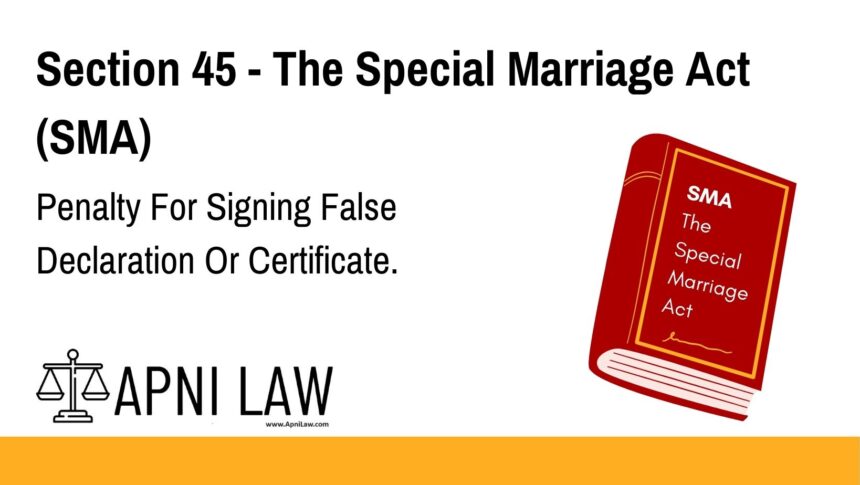Code: Section 45, Special Marriage Act, 1954
“Every person making, signing or attesting any declaration or certificate required by or under this Act containing a statement which is false and which he either knows or believes to be false or does not believe to be true shall be guilty of the offence described in section 199 of the Indian Penal Code (45 of 1860).”
Explanation of Section 45 – Special Marriage Act
Section 45 of the Special Marriage Act penalizes anyone who knowingly or dishonestly includes false information in any declaration or certificate required under the Act. Whether it is during notice of intended marriage, solemnization, or registration, any false statement made, signed, or attested with knowledge of its falsity makes the person criminally liable.
The section refers to Section 199 of the Indian Penal Code, which deals with giving false statements in legally binding declarations. This ensures that all formal procedures under the Act are carried out truthfully and with integrity.
Key Provisions
- Applies to anyone involved in making, signing, or attesting a declaration or certificate under the SMA.
- Covers any false statement knowingly made or believed to be untrue.
- Attracts criminal liability under:
- Section 199 IPC – False statement made in a declaration legally receivable as evidence
Read Section 199 IPC
- Section 199 IPC – False statement made in a declaration legally receivable as evidence
Illustration
Example 1: False Marital Status in Declaration
Ravi declares in the marriage notice under the Special Marriage Act that he is unmarried, while he is in fact already married under personal law. Since this is a required declaration under the Act and he knowingly made a false statement, he can be prosecuted under Section 199 IPC.
Example 2: False Age Information by Witness
A witness to a marriage attests a certificate stating that both parties are above 21, while knowing that the bride is underage. If proven that the witness knew or believed the statement to be false, he may be held guilty under Section 45 SMA and Section 199 IPC.
Common Questions & Answers on Section 45 SMA
1. What kind of declarations or certificates does this section apply to?
This includes declarations related to notice of intended marriage, solemnization certificates, and registration details under the Special Marriage Act.
2. What if someone unknowingly signs a certificate that turns out to be false?
Section 45 applies only when the person knows or believes the statement is false or does not believe it to be true. Honest mistakes without knowledge of falsehood are not punishable.
3. What is the punishment under Section 199 IPC?
Section 199 IPC prescribes the same punishment as for giving false evidence in court, which may extend to imprisonment up to 7 years and fine, depending on the circumstances.
4. Can a priest, registrar, or witness be prosecuted under this section?
Yes, if they attest or sign any false declaration or certificate knowingly or with dishonest belief.
Conclusion
Section 45 of the Special Marriage Act ensures accountability and truthfulness in the legal processes involved in civil marriages. By linking false declarations to criminal provisions under the Indian Penal Code, the Act emphasizes the seriousness of legal documentation and seeks to prevent fraud or misrepresentation.
For more detailed legal explanations and updates, visit ApniLaw.








